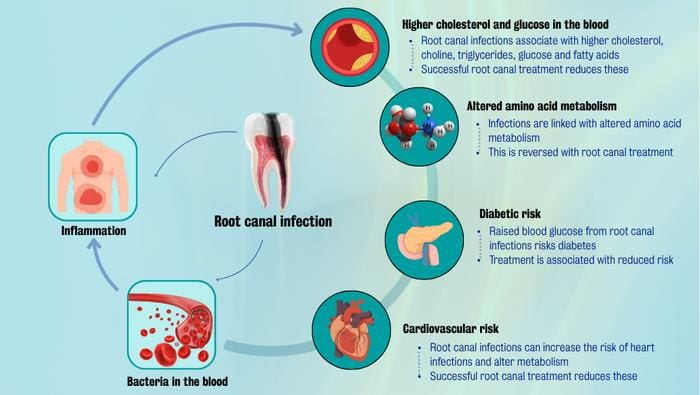Root canal treatments reduce the risk of heart disease and diabetes
Successful root canal treatment could reduce inflammation associated with heart disease and improve blood sugar and cholesterol levels.
In a clinical study by King’s College London, the first of its kind, the changes in blood chemistry after root canal treatment in a common dental infection (apical periodontitis) were investigated. The infection can cause bacteria to enter the bloodstream and increase inflammation, which is associated with risks to heart health and a reduced ability to control blood sugar levels.
Despite the link between the infection and wider health effects, the link between successful root canal treatment and the benefits for heart and metabolic health has not yet been studied.

The team found that successful root canal treatment was related to:
- Improved glucose metabolism: Blood sugar levels dropped significantly over a two-year period after treatment, which is an important factor in preventing diabetes.
- Better lipid profiles: Short-term improvements in blood cholesterol and fatty acid levels, which are closely related to heart health.
- Decreased inflammation: Key markers of inflammation commonly associated with cardiovascular risk and other chronic conditions decreased over time.
- Oral bacteria with effects on the whole body: Bacteria from infected teeth have been linked to changes in the body’s overall metabolism.
Root canal infections can cause bacteria to enter the bloodstream, which can lead to inflammation, heart disease, and an increased risk of diabetes. Successful treatment reduces these risks.
The study tracked the health of 65 patients at Guy’s and St Thomas’ NHS Foundation Trust over a two-year period after a root canal. The scientists analyzed molecules in the patients’ blood to reveal how the body processes sugar, fat and other important substances and responds to diseases and treatments. They used a technique called nuclear magnetic resonance spectroscopy (NMR), which is used to analyze proteins in the body.
The results suggest that monitoring metabolic markers in the blood, such as glucose, triglycerides and the protein tryptophan, could help assess recovery and risk after dental treatment.
Editor: X-Press Journalistenb├╝ro GbR
Gender Notice. The personal designations used in this text always refer equally to female, male and diverse persons. Double/triple naming and gendered designations are used for better readability. ected.




